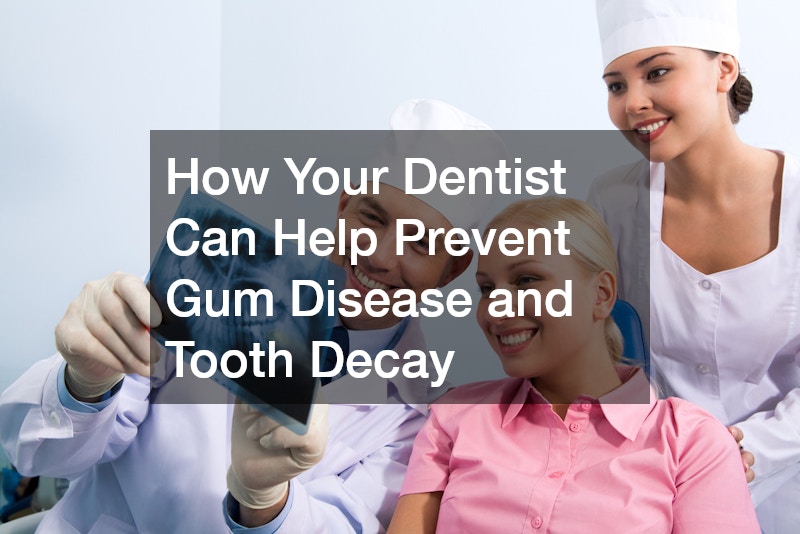
Maintaining dental health is crucial not only for a beautiful smile but also for your overall well-being. Dental professionals play an indispensable role in preventing gum disease and tooth decay, ensuring that your oral health is in top condition. Understanding the importance of such preventive measures not only saves you from dental discomfort but can also have long-term health benefits.
Gum disease, or periodontal disease, is a common infection that damages the soft tissue and bone supporting the teeth. It often starts as gingivitis, which is an inflammation of the gums caused by plaque buildup.
Video Source
If left untreated, it can progress to periodontitis, leading to tooth loss. Prevention involves regular brushing and flossing, combined with routine dental check-ups to remove tartar and plaque hidden under the gum line.
Your dentist can provide a personalized oral hygiene plan to combat gum disease. This plan often includes specific recommendations on brushing techniques, types of toothpaste and mouthwash for your needs, and dietary adjustments to reduce inflammatory responses in the gums. Additionally, professional cleanings are essential for eliminating bacteria that at-home practices may miss.
Regular dental visits are vital for preserving oral health. Most dental professionals recommend check-ups at least twice a year, although some patients may require more frequent visits based on individual needs. These appointments allow dentists to detect potential problems early and treat them before they become severe.
During these visits, dentists conduct thorough examinations to monitor your oral health. They assess gum health, periodontal pockets, and look for cavities or other abnormalities. X-rays may be taken to investigate hidden issues beneath the gum line or inside the teeth, ensuring nothing is missed.
Dentists are key players in maintaining oral hygiene by educating patients and providing preventive care. They empower individuals with advice on effective oral hygiene practices, customized to suit personal dental health needs. Their guidance covers techniques for brushing, flossing, and using interdental cleaners that ensure comprehensive plaque removal.
An important aspect of a dentist's role is to perform professional cleanings that remove tartar and plaque inaccessible through at-home care. These cleanings are essential for sustaining healthy gums and preventing both tooth decay and gum disease. Regular assessments and hygiene appointments also reinforce good oral habits among patients.
Recent advancements in dental science have introduced several innovative treatments to prevent tooth decay. One such development is the use of fluoride varnishes and dental sealants, which provide a protective layer over teeth, thereby reducing the risk of decay. Dentists recommend these treatments especially for children, as they are effective in guarding against cavities.
Another modern approach includes the use of antimicrobial agents and medications that target cavity-causing bacteria. These agents work in conjunction with traditional methods like fluoride treatments and serve to maintain a balanced oral microbiome, further preventing decay. Dietary adjustments and probiotics are also being explored to foster an environment that discourages bacterial growth.
Laser technology is gaining popularity in both diagnosing and treating early stages of tooth decay. This minimally invasive technique allows for precise decay removal while preserving more of the healthy tooth structure. With ongoing research and innovation, these treatments continually improve, making dental visits crucial for accessing the latest preventive care available.
Identifying early warning signs of dental issues is crucial in preventing severe tooth decay and gum disease. Symptoms like persistent bad breath, bleeding gums, or changes in tooth color should be promptly addressed by a dental professional. Early detection allows for simple corrective measures rather than more extensive interventions.
Pain or sensitivity in teeth can often indicate the beginning stages of tooth decay or gum disease. When these symptoms appear, immediate dental evaluation is paramount to determine the cause and appropriate treatment. Delay in treatment can lead to deteriorating conditions requiring more complex procedures like root canals or extractions.
The role of your dentist in preventing gum disease and tooth decay is indispensable. Through regular check-ups, professional cleanings, and personalized oral hygiene advice, dentists help maintain your smile's health and beauty. Staying vigilant for warning signs and embracing the latest dental technologies will ensure your oral health for years to come. Prioritize regular dental visits as an essential part of your healthcare routine for the prevention of dental diseases and maintenance of your overall well-being.
.